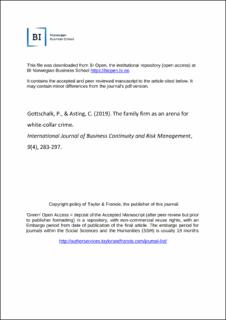| dc.contributor.author | Gottschalk, Petter | |
| dc.contributor.author | Asting, Cecilie | |
| dc.date.accessioned | 2019-10-08T06:29:19Z | |
| dc.date.available | 2019-10-08T06:29:19Z | |
| dc.date.created | 2019-01-09T13:27:15Z | |
| dc.date.issued | 2019 | |
| dc.identifier.citation | International Journal of Business Continuity and Risk Management (IJBCRM). 2019, 1-15. | nb_NO |
| dc.identifier.issn | 1758-2172 | |
| dc.identifier.uri | http://hdl.handle.net/11250/2620722 | |
| dc.description | Author's accepted manuscript | nb_NO |
| dc.description.abstract | In this article, we identify certain aspects of family firms that can cause specific personal motives, organisational opportunities and deviant behaviours. Based on the theory of convenience, we identify organisational opportunities for family members to defraud their own firm. We also identify personal willingness for non-family members to defraud the family firm where they work. We do not argue that white-collar crime is more or less frequent in family firms compared to other kinds of firms. There are several solutions to this problem. Family members should not have voting rights and privileges that cause actions without controls. Non-family members expect firms to pay them fairly and to stimulate them to identify with the business. | nb_NO |
| dc.language.iso | eng | nb_NO |
| dc.subject | white-collar crime | nb_NO |
| dc.title | The family firm as an arena for white-collar crime | nb_NO |
| dc.type | Journal article | nb_NO |
| dc.type | Peer reviewed | nb_NO |
| dc.description.version | acceptedVersion | nb_NO |
| dc.source.pagenumber | 1-15 | nb_NO |
| dc.source.journal | International Journal of Business Continuity and Risk Management (IJBCRM) | nb_NO |
| dc.identifier.cristin | 1653234 | |
| cristin.unitcode | 158,4,0,0 | |
| cristin.unitname | Institutt for ledelse og organisasjon | |
| cristin.ispublished | true | |
| cristin.fulltext | postprint | |
| cristin.qualitycode | 1 | |
